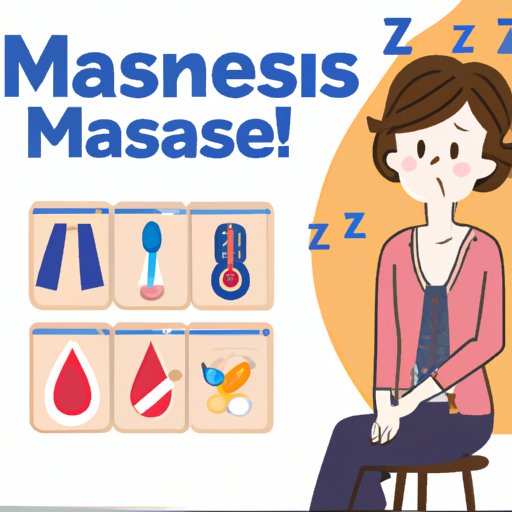
I. Introduction
Menopause is a natural biological process that marks the end of a woman’s reproductive years. However, it can be challenging to know when it starts because the symptoms can vary widely from person to person. In this article, we will explore the five main signs that indicate the start of menopause.
II. 5 Signs That Indicate the Start of Menopause
Menopause symptoms can range from mild to severe, but there are some common signs to look out for. Here are the five main signs that indicate the start of menopause:
Hot Flashes and Night Sweats
Hot flashes and night sweats are the most common symptoms of menopause. A hot flash is a sudden feeling of warmth that spreads over the body, often accompanied by sweating and a rapid heartbeat. Night sweats are hot flashes that occur during sleep, causing you to wake up drenched in sweat. These symptoms can last from a few seconds to several minutes and can occur several times a day or even at night.
Irregular Periods or a Change in Flow
As a woman approaches menopause, her menstrual cycle can become irregular. Periods may become lighter or heavier, and the time between periods may become longer or shorter. Some women may experience skipped periods or spotting between periods.
Vaginal Dryness or Discomfort During Sex
As estrogen levels decline during menopause, the tissues in the vagina can become thinner, dryer, and less elastic. This can cause vaginal dryness, which can lead to discomfort during sex and an increased risk of vaginal infections.
Mood Swings and Anxiety
Many women experience mood swings and anxiety during menopause. Hormonal changes can disrupt the balance of neurotransmitters in the brain, causing mood swings, anxiety, and even depression.
Fatigue and Sleep Disturbances
Insomnia and disrupted sleep patterns are common during menopause. Night sweats can wake you up at night and make it difficult to fall back asleep. Hormonal changes can also cause fatigue and exhaustion during the day.
III. The Average Age When Menopause Starts and What to Expect
The average age for menopause in the US is 51, but it can occur anytime between the late 40s and early 50s. Menopause officially starts when a woman goes without a period for 12 consecutive months.
During menopause, a woman’s body undergoes several changes, both physically and emotionally. Women may experience hot flashes, night sweats, vaginal dryness, mood swings, and decreased sex drive.
IV. Understanding the Stages of Menopause: How to Recognize the Beginning
Menopause is divided into three stages: perimenopause, menopause, and postmenopause.
Perimenopause
Perimenopause is the early stage of menopause that begins several years before menopause. During perimenopause, a woman’s ovaries gradually produce less estrogen, leading to irregular periods and other symptoms.
Menopause
Menopause is the stage when a woman has gone without a period for 12 consecutive months. Estrogen levels drop significantly during this stage, causing most of the common symptoms associated with menopause.
Postmenopause
Postmenopause is the stage that follows menopause. During this stage, menopausal symptoms typically subside, although some women may continue to experience symptoms for several years.
V. Perimenopause: The Early Signs of Menopause
Perimenopause is the phase that precedes menopause, and it can be confusing because the symptoms can mimic other conditions. Here are some of the common signs of perimenopause:
- Irregular periods
- Hot flashes and night sweats
- Mood swings
- Insomnia and other sleep disturbances
- Decreased sex drive
- Vaginal dryness
VI. How Your Body Changes When Menopause Starts: A Comprehensive Guide
Menopause brings about several physical and emotional changes in a woman’s body, including changes in hormones, bone density, and sexual health. The following are some of the changes to expect:
- Decreased estrogen and progesterone levels, which can lead to hot flashes, night sweats, mood swings, and vaginal dryness
- Reduced bone density, which can increase the risk of osteoporosis
- Weight gain, particularly around the midsection
- Increased risk of heart disease
- Changes in sexual health, including decreased sex drive and vaginal dryness
The good news is that many lifestyle changes and treatments can help alleviate menopause symptoms. Some of the most effective treatments include hormone replacement therapy, estrogen therapy, and lifestyle changes such as exercise, a healthy diet, and stress reduction techniques.
VII. Conclusion
If you are experiencing menopause symptoms, it’s essential to seek medical advice to determine the underlying cause. While menopause can be challenging, understanding the signs and symptoms can help you manage the changes and seek appropriate treatment.
Remember, menopause is a natural process that marks the end of a woman’s reproductive years. With the right support and information, you can navigate this stage of life with grace and confidence.





